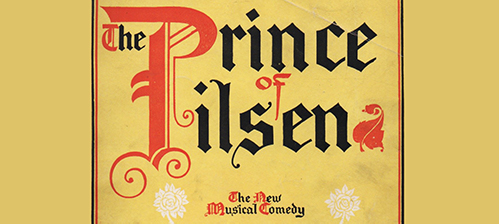Pas de biographie disponible.
Compositeur Musique additionelle Librettiste Parolier Metteur en scène Chorégraphe Producteur création Producteur version

Musical
Musique: Gustav Luders • Paroles: Gustav Luders • Livret: Frank S. Pixley • Production originale: 6 versions mentionnées
Dispo: Résumé Commentaire Génèse
The German-born composer Gustav Luders (1865-1913) was firmly established in the U.S. when he teamed with librettist-lyricist Frank Pixley (1867-1919) to create The Prince of Pilsen in 1902. The musical comedy, the third of their seven collaborations, was the team's most successful undertaking.
Genèse: The Prince of Pilsen opened in Boston at the Tremont Theatre in May 1902, and a script from this early version was deposited for copyright at the Library of Congress. Several musical changes occurred during the subsequent tryout period. “The Song of the Violet” was originally a solo for Edith in Act 2, and in the 1902 published vocal score, it had been transferred to Tom, still as a solo. Also changed is the opening verse-and-refrain section of what became “The Heidelberg Stein Song.” In the original, the male students call themselves “soldiers of love,” singing lines such as “The girls who have kissed us/We’ll not forget.” The revised opening, discussed earlier, is more nostalgic in tone than its slightly randy predecessor. On March 17, 1903, The Prince of Pilsen had its Broadway premiere at the Broadway Theatre, then located at 41st Street. The show had a respectable 147-performance run and returned to New York annually until 1907. Its American cast travelled to London, where it gave 160 performances at the Shaftesbury Theatre. The Prince of Pilsen was featured in the Shubert’s series of older musicals that graced the Jolson Theatre in 1930, and the delightful musical comedy continued to be revived, often with revised libretti, until at least 1957.
Résumé: Hans Wagner, a widowed brewer and alderman from Cincinnati, travels to Nice with his daughter, Nellie, in order to visit his son, Tom, who serves in the American Navy. The brewmaster, upon his arrival, is mistaken for the true Prince of Pilsen, Carl Otto. When the actual prince, who is studying in Heidelberg, appears with a group of his beer-loving friends, he decides to enjoy the blunder and ends up pursuing the Cincinnati brewer’s daughter. Tom, meanwhile, falls in love with Edith, a young woman from Vassar College, while Hans has his own romantic escapades with a wealthy American widow, Mrs. Crocker. Arthur St. John Wilberforce, Earl of Somerset, is the show’s antagonist; he is disappointed that Mrs. Crocker shows more interest in Hans than in him, for he is eager to access her fortune. A subplot finds Hans mistakenly possessing secret documents, but everything gets resolved once Carl Otto reveals his true identity.
Création: 17/3/1903 - Broadway Theatre (1445 Bway) (Broadway) - représ.

Musical
Musique: Gustav Luders • Paroles: Joseph Herbert • Livret: Joseph Herbert • Production originale: Florenz Ziegfeld • 1 version mentionnée
Dispo: Génèse Liste chansons
Genèse: Mam’selle Napoleon est une tentative malavisée du producteur Florenz Ziegfeld de créer un autre véhicule pour sa partenaire romantique Anna Held. Joseph W. Herbert a « américanisé » le scénario de la pièce française « Mlle Mars » de Jean Richepin. Herbert a aussi écrit les paroles d’une partition signée Gustav Luders. Charles Darnton, dans le New York Evening World, a apprécié la musique « animée », et Brooklyn Life a trouvé la partition « mélodieuse et accrocheuse ». Mais ce dernier journal a noté que, dans l’ensemble, le spectacle « dans sa forme actuelle » tenait « moins de l’œuvre de l’éminent parisien » que de l’adaptation d’Harbert. Le spectacle a dû sembler grinçant même en 1903 et a été une déception majeure qui n’a tenu l’affiche que cinq semaines. C’était l’une de ces pièces « historiques », genre tant apprécié dans le monde de l’opérette. Ici, l’héroïne fait la tournée des riches et des puissants. Dans ce cas, l’intrigue est centrée sur une liaison entre la star de la Comédie-Française Mademoiselle Mars (Held) et Napoléon (Arthur Laurence), mais leur liaison se termine quand il découvre qu’elle a aussi une liaison avec l’officier de la Garde Impériale Noel Gilot (Frank Rushworth). Malheureusement, l’empereur n’a pas eu droit à un moment musical, et le public et lui se sont donc vu refuser un « grand numéro » (peut-être sur l’ordre de « A Hex on My Complex » et de « Pastry and Posterity »).
Résumé:
Création: 8/12/1903 - Knickerbocker Theatre (Broadway) - représ.